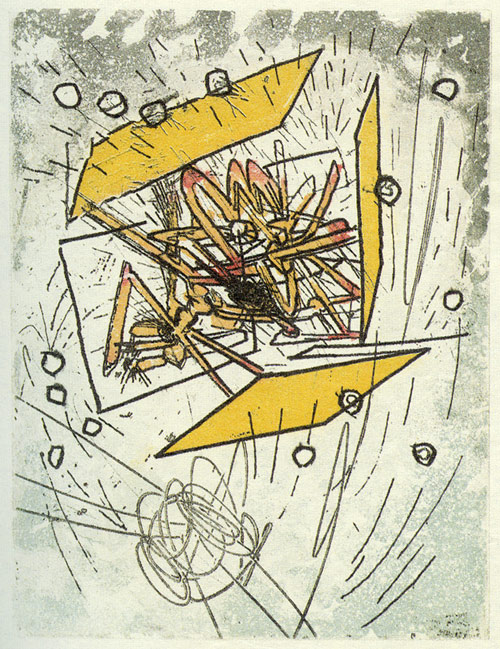An Excerpt and Introduction
Watchtowers on Targets, published in 1959, two years after L’Infini Turbulent, and three years after Miserable Miracle, is a collaboration with Chilean abstract expressionist Roberto Matta, the painter with whom Michaux felt the closest affinity. Matta and Michaux set up the following rules for their project: for the first two sections, Michaux would respond to Matta’s etchings, and for the third, Matta would work from Michaux’s writing. With its quick starts and abrupt stops in narrative, and without the overall narrative arc (however tentative) one usually sees in Michaux, the book is unusual within Michaux’s oeuvre. Early on, a crime is committed, but this storyline vanishes, only to be replaced by characters, beasts, and insects who appear unannounced, often disappearing as quickly as they appear. What remains central throughout the book is the activity of the eye in the flux of perception, in the rapid-fire correspondence between the visual and the verbal as supplied by Matta and Michaux.
Watchtowers on Target’s title enacts the ever shifting, tilted perspective of the book: a watchman, who, from his observation post, also becomes the target of observation, so that the very activity of “watching” turns back upon itself. The book is unedited and unrevised, most likely to keep the quick pace of response between Michaux and Matta intact. As though in continual correspondence, the whirlwind qualities of Matta’s etchings and Michaux’s quickly shifting verbal tableaus create a sense of upended spinning and multiplying that only ceases with the book’s last line, “Sun that is able to reunite.” This final line, which declares a re-stitching, or coming back together of the sun, Michaux takes care to italicize, to indicate a repair of, or response to, “sun’s slit throat,” the infamous last line in Apollinaire’s great poem “Zone.”
The middle section, “Correspondence,” is the only epistolary writing Michaux was to create. Playing with both the visual and verbal qualities of a postcard—and with its qualities of being “sent” and “received” within a correspondence—Michaux uses the word “card” in naming each of the six sections, and numbers them in sequence. This distinct, separate quality of each “card” draws attention to the individual world Michaux builds within each correspondence. In response, Matta presents each of Michaux’s “four observers” folded over the image of a playing card. The four observers, seated at a card table, are as intent upon the card as object as they are upon the spinning world of their own individual psyches, all while simultaneously engaged in the activity of exchange in a game of cards.
In his notes on Watchtowers on Targets in Oeuvres complétes, Raymond Bellour writes: “Actions and accidents, codes and phenomena crop up, making themselves known and disappearing just like dead stars . . . ”
It remains unknown whether it was Michaux or Matta who created the title, but Matta, who died in 2002, eighteen years after Michaux, often spoke of how, years after their collaboration, he experienced Michaux’s writing still “playing around in his head.” Matta explained, “Death interrupted me, I was counting so much on his presence, on the watchman. He was vigilant against my enthusiasm that could be a little too spontaneous at times, he restrained me and that was friendship. Now I am an orphan of this vigilance and I am becoming a target exposed to everything.”
—Gillian Conoley
(The entire text of Watchtowers on Targets will appear with two other Michaux texts in Thousand Times Broken: Three Books by Henri Michaux, forthcoming with City Lights in June 2014.)
CORRESPONDENCE
CARD I
The water from the Gulf is hot, always hot. It swells with fish. Bribdolette is doing well, but you must not be feeble with her. It’s not about looking for obstacles, you understand, but it’s the intrigue that bothers her, that’s all.
Mahouque is good.
You will have trouble with the Omerose.
CARD II
Here, everything speaks of above, comes from afar, stops short. No means however of passing the buck along. You guide yourself from great to greater. From greater to even greater yet. Then, you will be able to gather all who are small.
At the moment, we are with the Davas. Shoulder to shoulder. From there we are going to see the Tarasses. The Tarasses from Bloubios. Always equal, always brothers. We exchange wheels. Next are the Prissis from Oppropisis. That’s a necessity. And the tribe from Abbrassias will be taken. Always equal, always up to standard. Afterwards, it’s different. After, heads will be able to change.
In the meantime, we have to put some of our oil on it, you understand? Don’t reply with a tune. Reply frankly. I haven’t come here to milk the papayas.
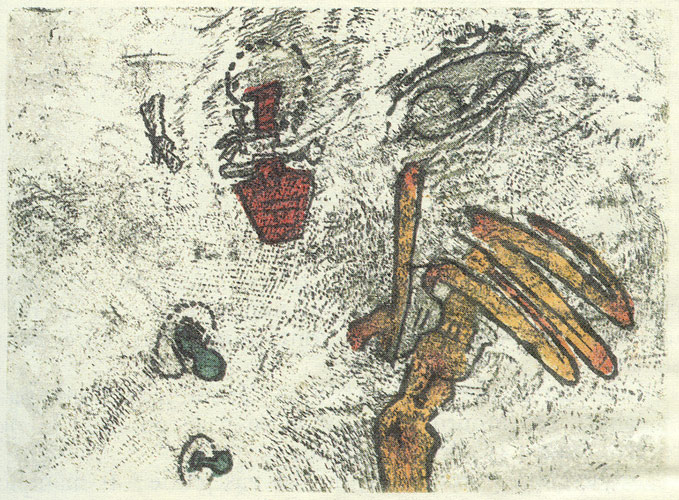
CARD III
I speak as a man, not a bird in a cage. Leave the stinking marsh. I’m not jealous. I don’t know him, your Ottolutre. Who takes care of an insect, if he isn’t scratched by it? The crux of the situation is here. I will bring the dead branch back to life. Otherwise in the fire, and no weeping. I don’t want a soft welding. It always falls apart at the worst moment and you find yourself on the ground, pronto.
CARD IV
What’s wrong with you now? Looks like you are drenched. Make them be quiet, damn it. We didn’t ask for their opinion. I don’t want a fuss from wide open mouths. You stop them, you hear, and now. Don’t lose your bow in the reeds.
CARD V
Lippa dismissed.
Dot discarded.
Glemmeche dismissed.
Yes, yes, quite the feat, I don’t deny that, but the standards are not yet up to scale. Examine the brave, and you will find one who is deaf. Then you might say, what can I do with someone who’s deaf?
Risia discarded and how! I’m not listening to you. Don’t waste your breath. Don’t come back on this trill in the air. I never come back to an abandoned alley.
Orquendon, why didn’t I keep him? He lacked a good grip if you must know. His exploits, always falling in, rolling around inside, that’s it, his adventures. Did you see where he held the levers? I’m telling you, he lacks a solid grip. What use would I have then, for a plug the water can remove?
CARD VI
Your letter slapped me in the face. You’re going to tell me that you were mistaken. You’re just a trembling calf. I vomit on your face, there that’s what I’m doing to your face. And don’t talk about Vena anymore. The furthest points are close when a being is injured and opens himself up to revenge. Shut up, meddler, and stop looking to do everything all at once and giving your opinion when you don’t know anything.
I’ll come back, on horseback, to the country, you can be sure of it. Soon, I’ll hold all of the palm leaves in my hand. It will be time then, not now.
Listen to the living first, and then you will respond to the dead. Remember this, shaken from the night-cap. I am not a cucumber, and the blood, you should know, flows easily from the chests of the weak. It flows abundantly, and they lay sprawled out on the ground until the end of time. I have known others, gossips who fell silent, their tongues, which they had thought to be so solid, but which could never stay in their little mouths, lay hanging out onto the floor.
IN SPACE THE FRAGMENTED LIFE
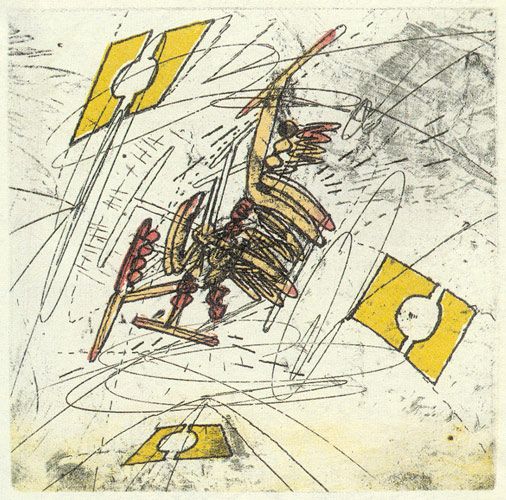
THE FOUR OBSERVERS
Then solidly fixed
he watches
him, the block, the one
perfectly aimed
the Charlemagne of machines
lowering his eye, conquering device…
The second is also here
money changer
arranger
image dealer
ready to be a woman if necessary
to be the other if necessary
to be a clown if necessary
Judas who will betray himself for the image
Operation swap and currency
The third is also here
the double, the two in one person
triple sphere
the argument on three points and seven pillars
the equilibrium, the supple, the seal
the being of regular deliveries
of inclined planes
combined differences
he who takes
who distributes
who spaces things out at intervals
…and the spectacle, presented in stages, comes to him
Calculated operation
The fourth, the fourth is also here
tied up, embarrassed, padded
sometimes in strings, sometimes in fog
looking for the problem in “there’s no problem”
and dreams and caresses the problem
Operation of winds
…but who will churn?
Below, quiet in their midst
divided as an empire
common as accomplices
dense as a millstone
dispersed like snowflakes
entrenched like one who is strong
open like the arenas
the object lies between the observers
However each witness
himself is four
four torn
looking to be “one”
by the grace of the object in sight
which seems simple
which seems as one
seems autonomous
which seems fixed
but, which, observed
starts to show its parts
and then in pieces
turns from here to there, jolted along
to be united in twinning, in outrageous pairings
(or remarkable or beautiful or comical)
in distant places
or loses itself on the spot, spangled object, in the light
excessive object
object in itching of objects
in a litany of objects
in a panorama of objects
in a sea of objects
of objects
of objects
of objects
as well as the said observer himself
object
objects
objects
objects…
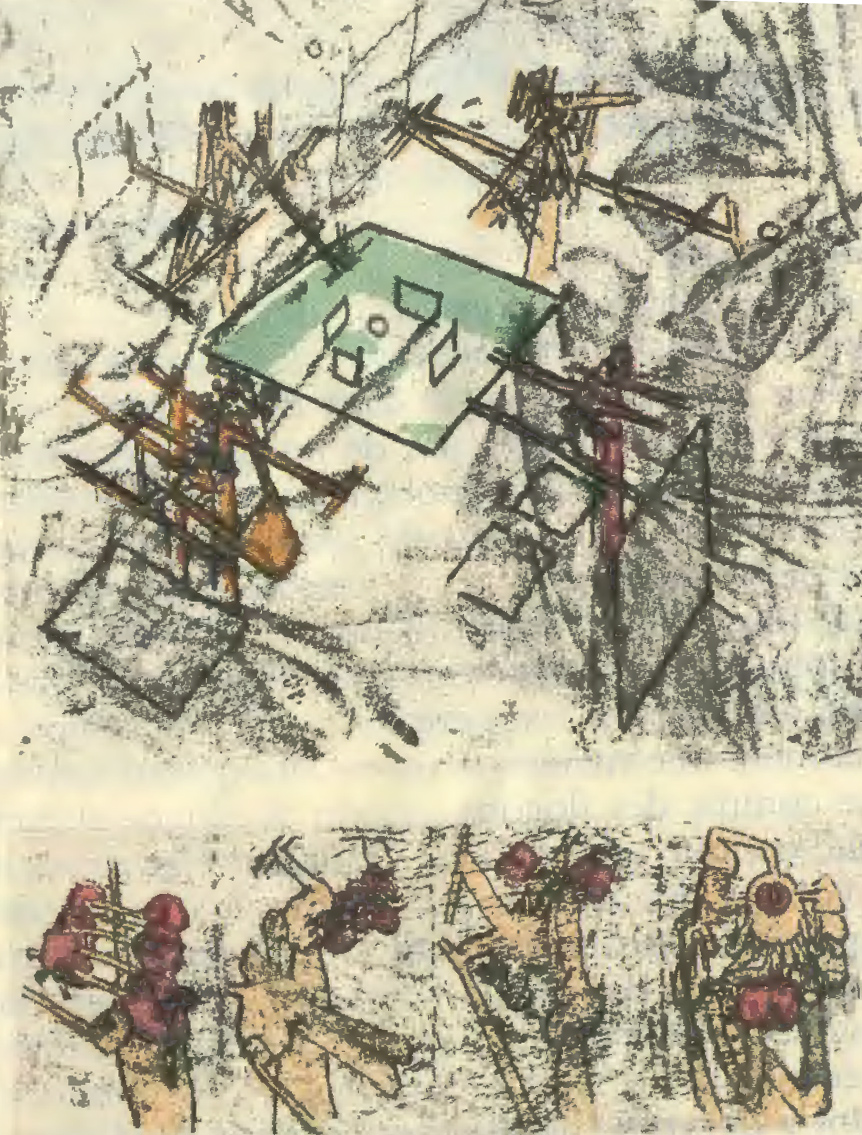
THE THIN MAN
Small
small in the wind
small and lacunary
hurried and knowing that quickly he must know
small, particular, in his own galaxy
watching
and by doing so, perpetually in fourths
in his automotor, his autocorrecter
in his little amount of peace
in his no peace at all
rustling under the shower of a thousand alarms
sounded
sifted
whistled
struck
pierced
thinking himself flesh
wishing himself in a palace
but living in the pulleys
countless and fragile
a watchmaker nonetheless
and a fetus as well, commanding through the squalls
aimed at
broken into
boarded
grabbed
clawed
struck with redoubled blows
engraved like a plaque
clicking like a teletype
displaced
diverted
his mirror broken a thousand times
frightened
listening
not wanting to be lost
drawing plans
of the plans drawing themselves in him
contradictory plans
foreign plans
plans bouncing back
infinite plans
struggling with plans
never quite submerged
and he will even smile soon
and then believe that life is happiness and sighs
and soft bodies brought close together,
in taught strings
and distraught notes
then again reversed
straightened
then a new alarm
in danger of being stopped
drained
exhausted
redoing plans,
counter-plans
plans of oppositions
in obscurity
into futurity
in indeterminacy
a pilot
pilot as long as he can
pilot until the end
pilot or nothing else
a target in midflight who scrutinizes
who draws plans
more plans
plans…
He who was born in the night
again and again will remake his Mandala
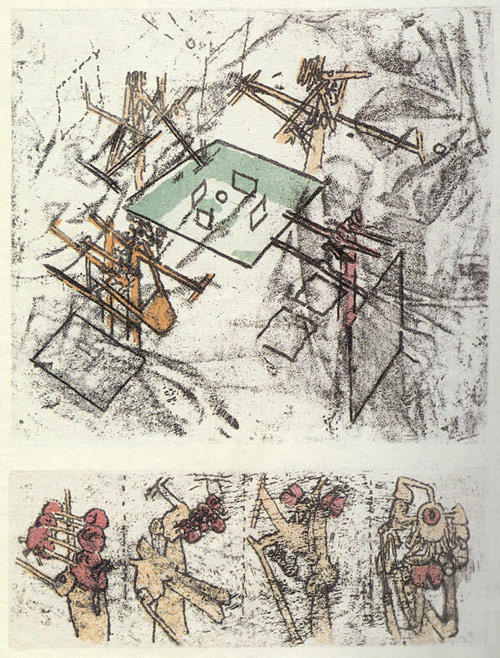
SHIELD UNDER BLOWS
Under the downpour which rains on him
under the incessant splashing
in the bubbling
he receives
what does he receive?
Difficult knowledge
difficult knowledge to know
Behind four screens
in his darkroom
he receives
The takes are multiple
the abandonments are multiple
Between 12 times knowing, 11 times doubting
and the wind,
the infinitesimal wind
wind coming from the unknown
the wind of uncertainty
the wind for the perpetuation of uncertainty.
Ubiquity through voices
through sounds
through tomorrows that advance and shout already
Ubiquity through the remains of old births
through contemporary howls
through recalcitrant absences
that require presence, intimate shrewd presence.
Trouble now
trouble similar to a peace turned upside down
peace similar to sea elephants
on an inhospitable beach
Reduced powers.
more powers
dust of powers
rain of rain
vertigo
bush of blades
that flees
that had fled
finished efforts…
The precious observatory plunged into the sea of senses.
Time
time passes
manna of time
what time?
From the depths however an incessantly flying apparatus arises
over the circles of the sleeping being
It is the hour where the poor and the fallen
like the rich and the important
gather a surprise harvest in unknown fields
where each, upon returning home, lives with its parasites
but a broom swept in turn
brings the outside in
the outside coming closer
one perceives
one perceives that one perceives
surge
Surge of oneself
surge against surge
And predator understands
Sun that is able to reunite
